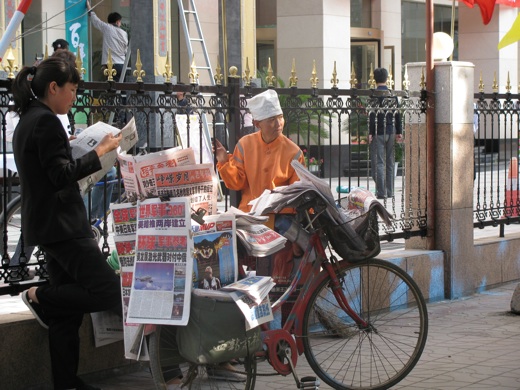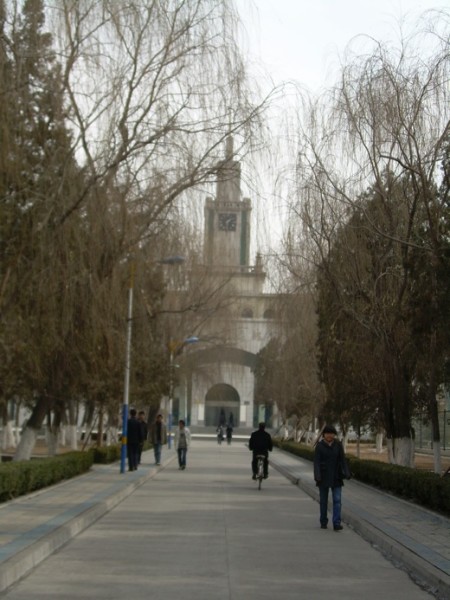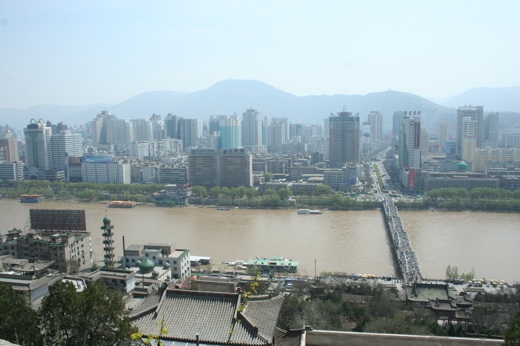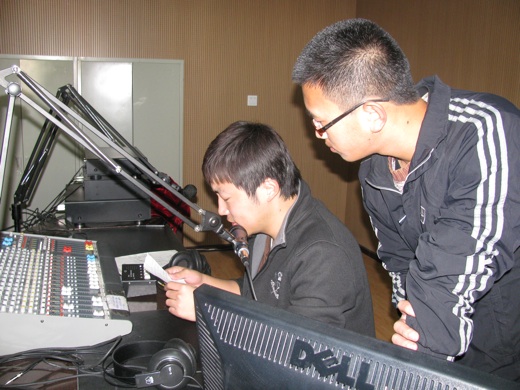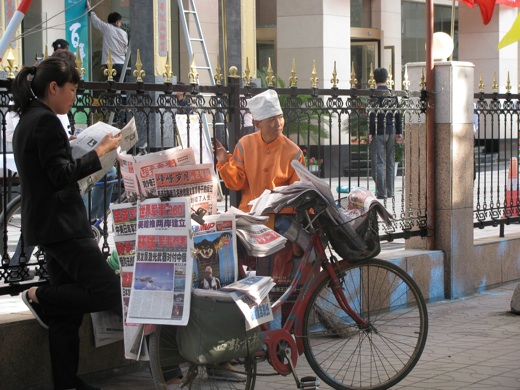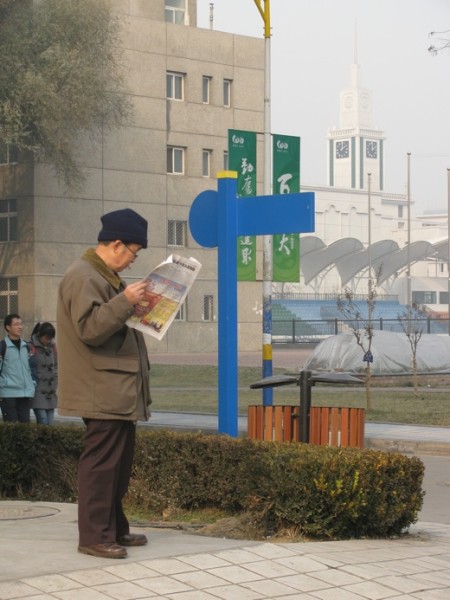I watched dozens of North Koreans bathing in the Yalu River. Their arms were deeply tanned and their legs were spindly, sticking awkwardly out of their bodies. Wearing only underwear and T-shirts, they bathed in the murky water. I gawked from a boat I had boarded across the Yalu in Dandong, China. My heart ached for North Korea, and I pitied the citizens’ poverty and seclusion from the rest of the world.
Chinese tourists pressed up against the rail of the boat and jostled me. They laughed, pointed, exclaimed, and steadied their cameras. After a moment of disgust, I realized for the past six months I had been in just their place as I observed the nation of China in crisis. In the same way the Chinese tourists on the boat felt removed from the depressing situation on the opposite shore, I had felt distant from the turmoil I witnessed as a foreigner living in Lanzhou, China, in the spring and summer of 2008.
There was the snow crisis in February, the Tibetan riots in March, the Wenchuan earthquake in May, and the Beijing Olympics in August. That span of seven months in 2008 was pivotal for the nation of China, and for me, as I observed the reactions to those dramatic events as a foreign exchange student in northwest China at Lanzhou University.
I was working toward a bachelor’s degree in journalism in the United States, and in my second year of college, with only a few required classes left, I decided not to pick up an extra major, but to pack up and spend a semester abroad. My only goals were to experience, to observe, to learn, and to write.
I first arrived in the dusty, crowded city of Lanzhou after spending several days crammed uncomfortably on trains, not being able to speak a word of the language and not knowing where exactly I was going or what I would do when I arrived. At that time, I would not have believed some of my favorite memories of that semester in China would be of spending day after day on trains, traveling aimlessly and alone to small cities across northern China, conversing in Chinese with anyone who was willing to talk to me. That time of travel and exploration was the culmination of four months of immersion through Lanzhou University’s Chinese language program for foreigners. At the end of the semester, I decided to put what I learned to use through travel since I might never use those language skills again. Or so I thought.
When I returned to the United States, I had no plans of going back to China. That semester abroad on the Yellow River had been a time of exploration and growth for me. It had changed me and shaped me, and after that parenthesis in my university education, I tried to continue on as normally as possible.
But readjusting to small-town American life was hard. I was often inexplicably angry and unhappy—not toward anyone or anything, but rather, I did not know how to deal with the issues and situations that had affected me while I was in China. I stopped studying Chinese, partly to try to regain a sense of normalcy, and I focused again on studying journalism at my university. But I kept wrestling with the issues that had sparked my interest during my time in China. I spoke at a national college media convention about how what I learned about the media in China related to the broader topic of travel journalism, and I spoke out on campus about government censorship in China. My head and heart were filled with questions and problems, and my restlessness was overwhelming.
The obvious solution, in my mind, was to return to Lanzhou University as an exchange student, to continue in the language program, and to research journalism in China at Lanzhou University. The scope of my project was narrow, but the implications broad.
The second time I entered the long, narrow city of Lanzhou I did so by airplane, on a flight from Beijing in September of 2009. I was familiar with the city, the campus, and the culture, so I settled in easily that fall, just one full year after my last departure. The furlough from studying Chinese, instead of being detrimental, gave the tough linguistic concepts time to marinate. I actually spoke the language better than when I left the country the previous August.
This second semester in Lanzhou was relatively uneventful. I did not travel or witness national crises as I had during my first semester abroad. I lived alone on the top floor of my dorm building and often cooked meals instead of going out. And, aside from the days I missed due to catching the H1N1 virus, I went to class every day. Most of the other international students were either from Central Asia or South Korea and were not open to communicating in a language other than their native tongues. While I did make friends, with those willing to use Chinese, I did not interact with my peers often. Instead, I focused on studying Chinese and learning about journalism and the media.
I was careful to go through the correct channels at the university. The form of approval I received for my project was an introduction to two journalism students who were delegated the task of helping me develop a small web of connections in the university’s journalism department to interview.
Three of the individuals I met and spoke with were especially open to conversation. Professors Liu Xiaocheng and Shi Ping and student Li Jinlong were eager not only to share with me their views on journalism in China, but also to understand my own perspective as an American journalism student.
I took the interviewees’ responses with a grain of salt, so to speak. I believe the responses of Liu, Shi, and Li were truthful and from the heart. But speaking on sensitive topics to an American is not something many Chinese citizens are open to doing. The interviewees spoke about self-censorship, and I will never know how much of that they did themselves when responding to my questions.
Another consideration is that the city of Lanzhou is fairly isolated. Until very recently in Chinese history, the Gansu Province, of which Lanzhou is the capital, was the western-most province in China. A rural area of desert and mountains, the economic situation in Lanzhou is not good. Many people live their entire lives without leaving the city and are therefore, not exposed to the more modern cities on China’s east coast, let alone to foreign ideas. At the same time, the viewpoints and opinions of the people in rural China are just as valuable, and perhaps more telling, than the mainstream ideas in the larger cities.
Furthermore, Liu, Shi, and Li only speak for themselves and do not claim to represent the entire nation of China. But their responses certainly give a glimpse into the minds and lives of millions just like them in China and present an alternate viewpoint to western ideas about journalism in China.
Professor Liu earned his bachelor’s and master’s degrees from Lanzhou University and has been teaching classes on media criticism, reporting on crises, and Chinese consumption culture for ten years. He is eager to be a friend to his students, a common attitude for professors in China. He has a toothy grin and darting eyes, and despite his youthfulness, he spoke with authority.
Like Liu, Professor Shi’s undergraduate and graduate degrees are also from Lanzhou University. She teaches about the history of Chinese journalism and also writes biographies of journalists. She is soft-spoken and has a round, girlish face, and she encourages discussion with her students outside of class. They greatly respect her.
Li is in his third year at Lanzhou University. As the student director of the undergraduate campus radio station, his classmates look to him for leadership. Li’s spoken Mandarin is exceptionally standard and clear, a skill prized by any journalism student in China. He used metaphors when answering my questions and spoke slowly, thinking through each word first.
My questions were basic, and I often did not realize the full implications of responses until listening to the interviews again later. Despite the language barrier, I recorded the opinions, beliefs, and viewpoints of two professors and a dozen students on the subject of journalism in China.
The particular questions that failed to translate between the cultures were surprising ones to me. I learned quickly, for example, that Chinese university students do not necessarily choose their fields of study or their universities. Instead, a serious and complicated formula based on test scores and geography determines where a student is placed. The obligatory introductory question of “Why did you choose to study journalism, and what interested you in Lanzhou University’s program?” left some student interviewees feeling dejected at the reminder they did not achieve their dreams.
“My scores were not at the right level, so I came here [to Lanzhou University],” said Li, staring at his feet. “When I came here, the school gave me this major. It’s not my choice. I would have chosen to study economics.”
Li shrugged his shoulders, and I continued with the interview, though I could not help but feel I had lost rapport through my accidentally insensitive first question.
Of course, some students in the major do desire to study journalism.
“More and more students choose journalism because it is their aspiration,” said Liu. “But there is no denying that our students choose journalism because they want to have a good job in the future. That is to say, they want to earn money and make a living.”
When Liu was entering college seventeen years ago, he did not know what being a journalist entailed; he only believed being a reporter was a job of high social status in China. But today, he said, students have a clear idea of what journalism and being a journalist mean for them and for their society.
That some journalism students were placed in their major and that their main goal is to make a living are explanations for self-censorship among Chinese journalists. Publishing questionable or boundary-pushing material is, in their minds, not worth losing their jobs.
In fact, self-censorship is considered the frontline of the censoring body in the Chinese government.
“The first part of the censorship department is the mass media itself,” said Liu. “We call it ‘self discipline’. They are controlled by themselves to avoid mistakes.”
Liu alluded to the rapid changes in the field of journalism in China since he was a student. The government is opening up and journalists have more freedom than they did in the past. But the changes have less to do with technology and more to do with the country departing from its past and leaving old ideas of journalism behind.
“Reporters a few decades ago had an extremely high social status, enjoyed many privileges, and were practically famous,” said Liu. He explained when a reporter from the national media visited a city or village, this reporter was treated with great respect because he represented the national authorities.
“Most people think that the communication of news is very important because the news includes government policies,” said Shi. Still today, students are taught in the classroom that the media is the mouthpiece of the government.
“As the government says, the journalist is the tongue of the government and the tongue of the people,” said Li, politely motioning to his mouth. He hears this mantra often in class.
Li believes, however, the concept is too broad to be practical. He wonders how he will be able to speak for both groups.
“I think the journalist plays the role of the tongue of the government,” he said. “But I think the word ‘people’ is too big. It’s not you and not me. It can’t represent the citizens, so I think the role of the journalist in China can’t help to develop our life and our society. It’s very different from Western countries.”
While Li has heard over and over that his role one day soon will be to speak both for the government and for the people, his professors are also just beginning to accept a new skill in the classroom: critical thinking. Heavily discouraged throughout much of recent Chinese history, the freedom and ability to question and to make one’s own ideas are now being accepted in Chinese society.
Western influences have significantly impacted the way journalism in China is taught in universities. Shi explained to me some of this recent history.
In the 1980s, foreign professors began coming to China to give lectures at universities. The nature of journalism in China was quite different then, with the effects of the Cultural Revolution just wearing off.
“They [foreign professors] even had to teach our students to use direct quotations,” said Shi, explaining that reporters at that time used indirect quotations. “Today, it is not even necessary for us to tell this to students.”
Three decades later, the changes in journalism deal mostly with writing style and technique.
“In my lectures, I point out the Wall Street Journal reporting method,” said Shi, referring to the delayed story lead which begins with an anecdote that leads into the heart of the story. “Since some reports now [in China] are human-interest stories, we are learning from this method as it is passed on from America.”
This is not to say Chinese journalists want to copy or emulate foreign journalists.
“It is not an imitation; it is a necessary way for China to become an international country,” said Shi of the recent changes in journalism from foreign influence. “After experimenting, we discard some foreign ideas because they cannot adapt to our reporting system.”
While the field of journalism in China is changing and adapting, the status of the journalist has gone from representing the government and speaking for it to a role more similar to that of a Western journalist, seemingly speaking for the citizens.
“If a journalist has a good work ethic and goals for the job, whatever he does will be difficult,” said Liu.
A reporter criticizing Chinese society or government, for example, might have difficulty finding a newspaper to publish her work. According to Liu, this self-censorship reflects the attitude of Chinese society rather than of the government.
“Our government is more and more open-minded,” said Liu. “So, from this angle, the reporting is much easier than before.”
Chinese citizens know media control and censorship exist. The attitude toward the censorship, though, is not always negative. Most believe the government censors information for the good of the public: to remove pornographic content; to prevent violence before it begins; to guard the Chinese public against international media attention; and to stop frivolous rumors.
Liu shared a specific example of government censorship for the benefit of the population. On May 12, 2008, a massive earthquake rocked central China; I remember this day clearly from my first semester at Lanzhou University. The image of classroom desks undulating like ocean waves is imprinted on my mind, and the crack across the ceiling of the dormitory was a constant reminder of the thousands who lost their lives in the Wenchuan earthquake that day in Sichuan Province.
“Some media outlet invited models wearing skimpy clothing and took their photographs on the earthquake site,” said Liu. “Can you imagine the media doing this when other Chinese people are mourning? So the government punished this [outlet].”
He explained the photographs were censored, and the media outlet was banned from reporting. Liu believes the government did the right thing in censoring what he called insensitive and inappropriate material that came from irresponsible journalists.
“Nowadays, censorship focuses on false reports, entertainment news, and pornography,” said Liu. “The [Western] opinion that Chinese media is controlled strictly will soon disappear. Admittedly, I think Chinese media is controlled by the government, but not as severely as you might imagine.”
In fact, the Chinese are often angered by how Westerners view China and Chinese journalism.
“It’s true that Chinese journalists have said false things, like in 1989 in the events of Tiananmen Square,” said Li. “But I think it’s not the journalists. The government made them say these things. But in this area, I don’t think the Western countries always say true words, like with Tibetan events.”
Another Chinese crisis and its ensuing censorship that impacted my semester abroad was the Tibetan riots in March of 2008. At the time, I had heard rumors of unrest, so I searched Google News; I found nothing. Finally, I tried a very specific query and found a headline and lead from the Washington Post. “LANZHOU, CHINA—A group of Tibetan college students, heads downcast, sat silently in the middle of a soccer field Monday as nervous officials …” Of course, I was not permitted to open the link, but I had confirmation from the outside world that important information was being censored.
Five months later in America, I searched for that same article. Not only did I read the rest of it, but I was able to read all about the protest in Lhasa, Tibet, that the Lanzhou protest was reportedly connected to. I was surprised, however, at the inconsistencies I found among the various articles. It seemed as if no one was able to truly ascertain what was going on in Lhasa, in Lanzhou, or even in Beijing during that time. I doubted much of the information in the Western reports.
“With the situation in Lhasa, we found that it was the international media who fabricated information,” said Liu Xiaocheng. “There is a very popular saying in China that has been spreading over the Internet: ‘Don’t be like CNN.’”
Many Chinese believe Western media and their reports on Tibet are biased toward the desire for Tibet to gain independence. As a result, they believe, foreign nations unjustly attack and demonize China. And Chinese citizens take the judgment personally. Therefore, some Chinese citizens believe censorship of foreign reports protects the Chinese public.
“I think their goal is to make trouble for China,” said Li, angered about the Western reports on Tibetan incidents. “America is actually very hostile toward China. This attitude is unnecessary.”
Whether one system is right or wrong, posed Liu, is not up to one society to decide for the other.
“It does not matter to which country or to which political system the journalism belongs,” he said. “We should hold on to the rooted theories of objective and truthful news and clear reporting.”
Li believes the issue runs deeper than journalists and the media.
“It’s not about having a problem with Chinese news journalists, having prejudice toward them,” he said. “It’s completely that they [Americans] have a prejudice toward China; toward China’s government they have prejudice.”
I told Liu of my inability to find news on the Tibetan riots when they occurred. I asked him what action he takes when he knows information is blocked, but he wants to find out anyway.
“I want to know, you want to know, everyone wants to know,” said Liu. “But sometimes that information is not available to us. I will make my own judgment on the information available.”
His attitude is strikingly “Chinese.” That one person would have more of a right to information than another is absurd; accepting problems as a matter of fact and moving on is a way of life.
“Control happens often,” said Liu, mentioning how all of society is controlled by various forces to maintain order. For example, he asked me about the regulations for an American to travel to China and pointed out I was being controlled by the requirement to have a passport and visa.
“In America, the government also controls the media,” said Liu with conviction. “Companies control it, and journalists also self-censor. Control isn’t a negative thing. It depends on how it is controlled.”
Like many Chinese, Liu’s view is that the American media is controlled to a similar extent that Chinese media is controlled. He referred to freedom of the press in America as “so-called.” The main difference, in Liu’s eyes, is Americans are blind to censorship and media control because it is subtle. The Chinese are aware, to a large degree, of what happens in their country; Chinese believe they are being fooled, and Americans are fooling themselves.
“It may be hard for you Americans to understand why [media control] happens,” said Liu. “It’s not that we’re worried about anything; it’s not that we’re afraid of anything. If it’s not acceptable information, it should not be broadcast.”
Liu is correct; understanding the Chinese perspective is difficult for Westerners and Americans. In order to understand journalism and its role in Chinese society, understanding China, its history, and its culture must come first.
“Today, China doesn’t need you to come here to help us, but we do need you to come here to understand us,” said Shi.
And the first step, she said, is for Americans to visit the less developed regions of China, like Lanzhou.
“Moreover, I hope that you Americans can learn Chinese to reduce obstructions in communication, and so that you can understand what is the real truth,” Shi said.
My journey toward even beginning conversations at Lanzhou University about journalism and media control in China lasted over one year. I did not always know what I was experiencing when certain situations occurred. Not until much later—with open Internet access, the detailed journal I had kept, and a fabulous Chinese-English dictionary—was I able to connect some of the dots and make sense of the mess I had thrown myself into. Hearing directly from Chinese citizens and those knowledgeable about the changing field of journalism in China, instead of answering all of my questions and making sense of everything, helped me to consider another perspective and have an understanding and sensitivity toward a different culture on a whole new level.
“I hope that you can give Americans a more accurate picture of China,” Li said to me.
He also wants more opportunities for Americans and Chinese to understand each other and learn from each other. Li looked at me and smiled, saying, “Next time you come to China, please don’t come alone.”
In 2008 I watched the nation of China go through successive crises; I was in the midst of everything and yet so distanced from it. I often think back to my feelings while on the boat watching the North Koreans bath in the Yalu River, so close to them, yet lacking any understanding of their lives. I watched the children splash each other, laughing. Their mothers chatted while wringing out their clothes, drying them on the shore in the August sun.
To pity them is to believe my perception of my freedom and happiness is worth more than theirs, which is simply not true. In the same way I later decided not to judge the North Koreans as living pitiful and tormented lives, I learned not to judge the Chinese and their society based on the standards I have learned in America. Without beginning to understanding China’s history, culture, and society, and how those factors affect journalism in the country, the rest is judgment. And I still have much to learn.
- Follow us on Twitter: @inthefray
- Comment on stories or like us on Facebook
- Subscribe to our free email newsletter
- Send us your writing, photography, or artwork
- Republish our Creative Commons-licensed content

